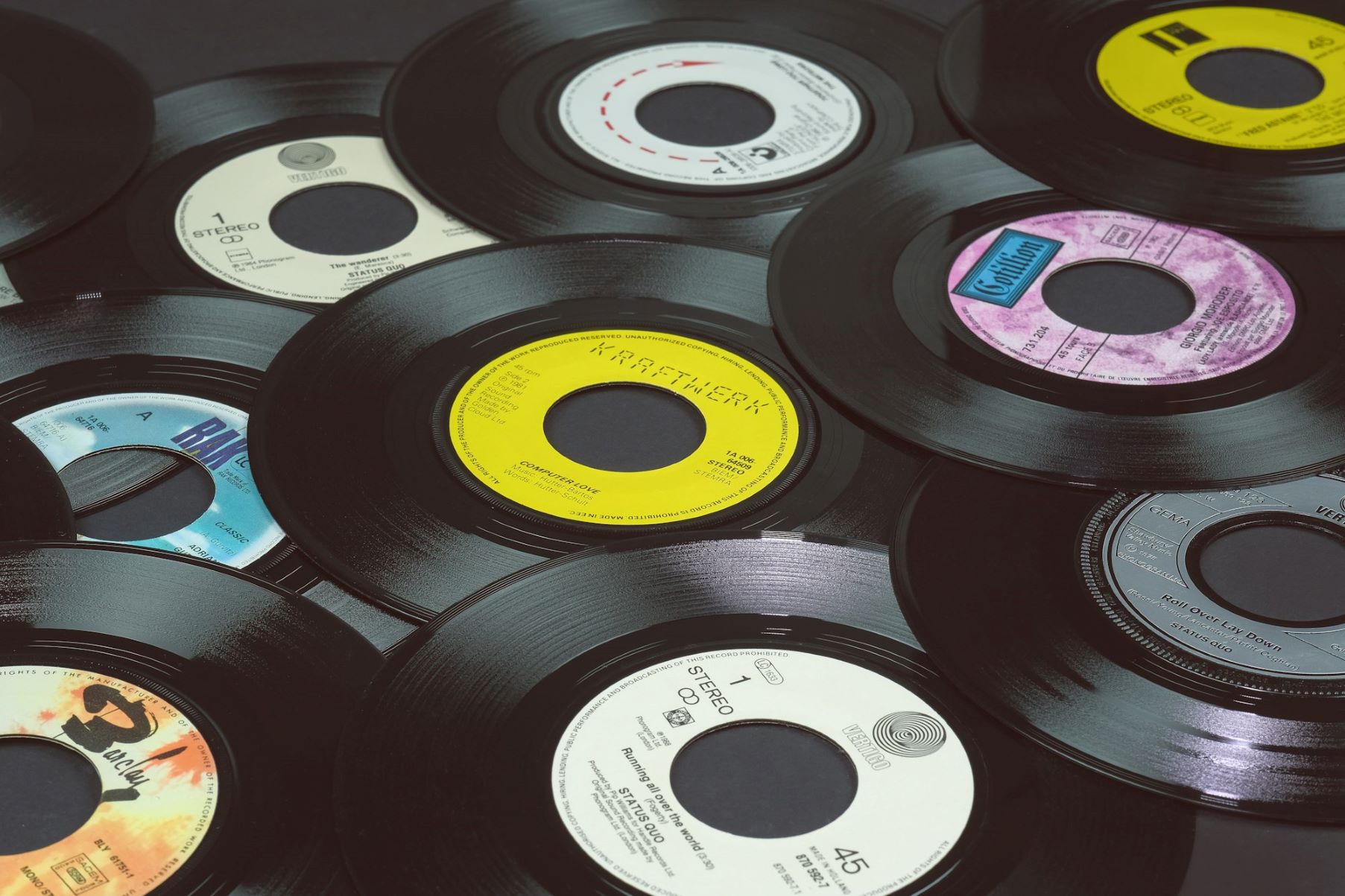Home>Production & Technology>Record Label>What Is The Record Label


Record Label
What Is The Record Label
Published: January 25, 2024
Discover what a record label is and how it plays a crucial role in the music industry. Explore its functions, benefits, and importance in nurturing and promoting artists.
(Many of the links in this article redirect to a specific reviewed product. Your purchase of these products through affiliate links helps to generate commission for AudioLover.com, at no extra cost. Learn more)
Table of Contents
Introduction
In the highly competitive and ever-evolving music industry, record labels play a pivotal role in the success of artists and the dissemination of their music. A record label is essentially a company that discovers, develops, markets, and distributes music recordings on behalf of artists or groups. These labels can range from small independent entities to larger major labels with significant resources and influence.
Record labels have been a fundamental component of the music business for decades. They provide artists with the necessary guidance, expertise, and financial support to navigate the complex industry landscape and reach a wider audience. Additionally, record labels help bridge the gap between musicians and consumers, ensuring that the artists’ work is promoted and made available through various distribution channels.
In this article, we will delve into the intricacies of record labels – what they are, how they function, the different types, and the roles and responsibilities they hold. We will also explore the benefits and challenges of signing with a record label, discuss the significance of independent versus major labels, and highlight the overall importance of record labels in the music industry.
Whether you’re an aspiring artist looking to understand the industry better or a music enthusiast curious about the inner workings of the business, this article will provide you with a comprehensive overview of record labels and their impact.
Definition of a Record Label
A record label is a company or organization that specializes in the production, promotion, and distribution of music recordings. Also known as a recording label or simply a label, these entities serve as intermediaries between artists and the wider music industry, acting as the bridge that connects talent with audiences.
Record labels are responsible for discovering and signing artists or musical groups. Once signed, they provide the necessary financial and logistical support to facilitate the production and release of an artist’s music. This support can include funding for studio time, production costs, marketing and promotion, and distribution.
In addition to providing financial resources, record labels also offer crucial expertise and guidance to artists. They help with aspects such as branding, image development, and marketing strategies. Moreover, record labels often have established relationships with various industry stakeholders, such as music streaming platforms, radio stations, and concert promoters, allowing them to secure valuable exposure and opportunities for their artists.
It’s important to note that a record label’s involvement goes beyond the mere production and distribution of music. These entities also handle licensing, negotiations, and management of royalties and copyrights. They play a vital role in protecting an artist’s intellectual property and ensuring that they receive fair compensation for their creative work.
Furthermore, record labels have traditionally been the gatekeepers of the music industry. Their judgment and decision-making power can greatly shape an artist’s career trajectory. Being signed to a reputable label can lend credibility and legitimacy to an artist’s work, opening doors to collaboration opportunities, industry recognition, and increased visibility.
It is worth mentioning that the rise of digital platforms and the democratization of music production and distribution have challenged the traditional role of record labels. Independent artists now have greater freedom to release and promote their music on their own terms. Nonetheless, record labels still hold immense influence and remain central figures in the music industry.
In the following sections, we will explore the various functions, types, and roles of record labels in more detail, shedding light on their significance in helping artists navigate the complex music industry landscape.
Functions of a Record Label
Record labels serve a multitude of functions in the music industry, playing a pivotal role in the success and growth of artists. While the specific functions can vary depending on the size and resources of the label, here are some common functions performed by record labels:
- Artist Development: One of the primary functions of a record label is to invest in and develop artists. Labels provide artists with the necessary resources, such as funding for studio time, production, and marketing, to nurture their talent and help them reach their full potential. This can involve hiring producers, songwriters, and other professionals to enhance the quality of the artist’s music.
- Recording and Production: Record labels handle the recording and production process of an artist’s music. They provide access to recording studios, engineers, and equipment to ensure high-quality production. Labels may also assist with the selection of songs, arrangement, and overall sound of the album or tracks.
- Marketing and Promotion: A crucial function of record labels is to market and promote an artist and their music. This involves developing marketing strategies, creating promotional materials, and coordinating advertising campaigns to generate awareness and buzz around the artist’s work. Labels also work to secure media coverage, organize press releases and interviews, and manage social media presence.
- Distribution: Record labels have the expertise and networks to effectively distribute an artist’s music to various platforms and outlets. They handle the logistics of physical and digital distribution, ensuring that the music is widely available to consumers through channels such as streaming services, online stores, and physical retailers.
- A&R (Artist and Repertoire): The A&R department of a record label is responsible for talent scouting and artist recruitment. They actively seek out new and promising artists, attend showcases and performances, and evaluate demo submissions. A&R personnel play a critical role in identifying artists with commercial potential and assisting in the signing process.
- Legal, Licensing, and Royalties: Record labels handle the legal aspects of an artist’s career, including contract negotiation, licensing agreements, and the management of royalties. They ensure that artists are properly compensated for their work and monitor the usage of copyrighted materials.
- Touring and Live Performances: Many record labels assist artists in organizing and managing their touring schedules and live performances. They help secure concert bookings, negotiate performance fees, and arrange logistical details to maximize the artist’s touring opportunities.
These are just a few examples of the functions that record labels fulfill. They play a critical role in providing the necessary resources, expertise, and infrastructure for artists to thrive in the music industry. While the rise of independent music strategies has allowed artists more autonomy, record labels continue to be key players in shaping and promoting the careers of artists.
Types of Record Labels
Record labels come in various types, each with its own unique characteristics and operations. Understanding the different types of record labels can provide insight into the artist-label relationship and the dynamics of the music industry. Here are a few common types of record labels:
- Major Labels: Major record labels, also known as major label conglomerates or simply majors, are the largest and most influential labels in the industry. They have significant financial resources, global reach, and established relationships with other industry entities. These labels include Warner Music Group, Sony Music Entertainment, and Universal Music Group. Major labels typically sign established and commercially successful artists and have the power to heavily promote and distribute their music.
- Independent Labels: Independent record labels, or indies, are smaller labels that operate independently of major label conglomerates. They are known for their focus on artist development, creativity, and genre-specific niches. Independent labels have more flexibility in their decision-making process and often prioritize artistic vision over commercial success. They have been instrumental in launching the careers of many influential artists in various genres.
- Subsidiary Labels: Subsidiary labels are labels that operate under the umbrella of a major label. These labels are usually created to focus on specific genres, subcultures, or regional markets. While they benefit from the resources and distribution network of the major label, subsidiary labels often maintain a degree of independence and unique identity.
- Vanity Labels: Vanity labels, also known as artist-owned or boutique labels, are labels that are founded and owned by artists themselves. The purpose of vanity labels is to give artists greater control over their music and career. These labels allow artists to maintain ownership rights and creative control while leveraging the resources and expertise of a traditional label for distribution and promotion. Jay-Z’s Roc-A-Fella Records and Madonna’s Maverick Records are examples of successful vanity labels.
- Digital Labels: With the rise of digital music platforms, digital labels have emerged as a significant force in the industry. These labels prioritize digital distribution and often focus on genres that thrive in the digital realm. Digital labels are adept at leveraging online platforms, social media, and streaming services to promote and distribute music. They offer artists a more streamlined and efficient approach to releasing and monetizing their work.
- DIY (Do-It-Yourself) Labels: DIY labels are essentially self-run labels where artists independently handle all aspects of their music career, including recording, marketing, distribution, and promotion. DIY labels have gained popularity with the democratization of music production and the availability of online tools and platforms. While DIY labels may lack the resources and reach of major labels, they often offer artists more creative control and a DIY ethos.
It is important to note that these categorizations are not strictly defined, and there can be overlap between different types of labels. Additionally, the dynamics and landscape of the music industry continue to evolve, leading to the emergence of new label models and hybrids.
Understanding the different types of record labels helps artists and music enthusiasts navigate the industry landscape and make informed decisions regarding career paths, partnerships, and overall strategies.
Roles and Responsibilities of a Record Label
Record labels play a crucial role in the success and development of artists in the music industry. Their responsibilities go beyond simple production and distribution of music. Here are some key roles and responsibilities of record labels:
- Artist Development: One of the primary responsibilities of a record label is to foster and cultivate the talent of artists. This involves providing financial support for studio time, production costs, and marketing efforts. Labels guide artists in refining their sound, image, and overall brand, helping them establish a unique identity in the industry.
- Production and Distribution: Record labels oversee the recording and production process of an artist’s music, ensuring high-quality production standards. They handle the logistics of distributing physical copies of albums, as well as the digital distribution through various streaming platforms and online stores. Labels have the necessary connections and resources to maximize the visibility and availability of an artist’s music.
- Marketing and Promotion: Record labels are responsible for creating effective marketing strategies and promotional campaigns to generate awareness and interest in an artist’s music. This includes designing album artwork, creating music videos, securing airplay on radio stations, arranging interviews, and organizing live performances and tours. Labels have the expertise and industry connections to secure valuable media coverage and exposure for their artists.
- A&R (Artist and Repertoire): The A&R department of a record label identifies and signs new talent. They actively seek out promising artists, evaluate demo submissions, and attend showcases and performances to discover new acts. A&R personnel work closely with artists throughout their career, providing feedback, guidance, and support.
- Legal and Financial Management: Record labels handle the legal aspects of an artist’s career, including contract negotiations, licensing agreements, and copyright protection. They ensure that artists are compensated properly for their work and manage the collection and distribution of royalties. Labels also handle financial management and budgeting, accounting, and reporting for artists and their projects.
- Touring and Live Performances: Many record labels assist artists in organizing and managing their touring schedules and live performances. They book concert venues, negotiate performance fees, and handle logistics such as travel arrangements, accommodations, and technical requirements. Labels support artists in maximizing their live performance opportunities and growing their fan base.
- Support and Guidance: Record labels provide artists with a support system and guidance throughout their careers. They offer advice on career decisions, image building, and strategy implementation. Labels act as a liaison between the artist and the various professionals in the industry, such as producers, songwriters, publicists, and agents.
It is important to note that the specific roles and responsibilities of a record label may vary depending on the label’s size, resources, and genre focus. For example, major labels may have larger teams and more comprehensive support systems compared to independent labels.
Ultimately, record labels act as advocates for artists, working to enhance their exposure, maximize their revenue, and guide their artistic growth. Their expertise and industry connections are invaluable assets in helping artists navigate the complex landscape of the music industry.
Benefits and Challenges of Signing with a Record Label
Signing with a record label can be a significant milestone for artists in their music careers. While it offers numerous benefits, it also presents certain challenges. Here are some key benefits and challenges of signing with a record label:
Benefits:
- Financial Support: One of the primary advantages of signing with a record label is the financial support they provide. Labels invest their resources in artists, covering expenses such as studio time, production costs, marketing, and promotion. This financial backing allows artists to focus on their craft and reach a wider audience.
- Professional Guidance and Expertise: Record labels offer artists professional guidance and expertise in various aspects of their music careers. They have teams of experienced professionals who can provide valuable advice on songwriting, production, branding, and marketing strategies. Labels can help artists refine their sound, image, and overall brand, enhancing their chances for success.
- Industry Connections: Record labels have established relationships with key players in the music industry, such as music streaming platforms, radio stations, and concert promoters. These connections can greatly benefit artists by providing opportunities for exposure, airplay, and live performances. Labels can help artists secure valuable placements and collaborations, leading to increased visibility and career opportunities.
- Marketing and Promotion: Record labels have the expertise and resources to effectively market and promote an artist’s music. They develop comprehensive marketing strategies, create promotional materials, and coordinate advertising campaigns to generate awareness and buzz. Labels have access to industry networks, media contacts, and digital platforms, which can significantly increase an artist’s presence in the music landscape.
- Distribution and Global Reach: Record labels have the infrastructure and distribution networks to ensure that an artist’s music reaches a wide audience. They handle the logistics of physical and digital distribution, making an artist’s music available through various platforms and outlets. Labels can help artists expand their reach globally, accessing international markets and audiences.
Challenges:
- Limited Creative Control: Signing with a record label often entails relinquishing a certain degree of artistic control. Labels may have specific expectations and preferences regarding an artist’s sound, image, and direction. Artists might face challenges in maintaining their artistic integrity and creative vision when working within the label’s framework.
- Contractual Obligations: Record label contracts can be complex and legally binding. Artists need to ensure they fully understand the terms and conditions before signing. Contracts may include provisions relating to exclusivity, ownership of masters, royalties, and length of commitment. It’s essential for artists to have legal representation to negotiate favorable terms and protect their interests.
- Competition and Pressure: The music industry is highly competitive, and artists signed to record labels often face increased pressure to deliver commercially successful music. Labels may have expectations and targets for sales, streaming numbers, and chart success. Artists must handle the pressure and manage the balance between their creative expression and commercial viability.
- Dependency on Label’s Decisions: When signed to a record label, artists are reliant on the label’s decisions and strategies. Labels have the final say on matters such as release schedules, marketing budgets, and artist promotions. Artists may need to navigate and negotiate with the label to ensure their visions align and that they have a say in critical decisions affecting their careers.
- Revenue Sharing and Royalties: While record labels provide financial support, artists should be aware of the revenue-sharing and royalty structures outlined in their contracts. Labels typically recoup their investments from an artist’s earnings before the artist begins receiving significant income. Artists should carefully evaluate the financial implications and ensure they understand how royalties are calculated and distributed.
Signing with a record label can open doors and provide opportunities for artists to advance their music careers. However, it’s essential for artists to carefully consider the benefits and challenges, weigh their options, and make informed decisions that align with their artistic goals and aspirations.
Independent vs. Major Record Labels
In the music industry, artists have the option to sign with either independent or major record labels, each with its own distinct characteristics and advantages. Understanding the differences between these two types of labels can help artists make informed decisions about their music careers.
Independent Record Labels:
Independent record labels, also known as indie labels, are smaller entities that operate independently of major label conglomerates. Independent labels are typically characterized by their focus on artistic development, genre-specific niches, and non-mainstream music. Here are some key aspects of independent record labels:
- Artist Freedom and Creative Control: Independent labels often prioritize artistic freedom and creative control. Artists have greater autonomy in making decisions regarding their music, creative direction, and career trajectory.
- Closer Artist-Label Relationship: Independent labels tend to have closer and more personal relationships with their artists. Artists may have direct access to label executives and decision-makers, facilitating a more collaborative and hands-on approach.
- Flexibility and Niche Focus: Independent labels have more flexibility and are more likely to embrace non-mainstream genres and experimental music. They cater to niche markets and audiences, allowing artists to explore and develop their unique styles.
- Creative Marketing Strategies: Independent labels often employ innovative and creative marketing strategies to promote their artists. They may rely on grassroots efforts, online platforms, and targeted promotions to reach their intended audience.
- Artist Development and Support: Independent labels are known for their emphasis on artist development. They can provide personalized attention, mentoring, and guidance to help artists refine their craft and build sustainable careers.
Major Record Labels:
Major record labels, also known as major label conglomerates, are larger and more influential labels that are part of major media corporations. These labels typically have global reach, significant financial resources, and established relationships with industry stakeholders. Here are some key aspects of major record labels:
- Financial Backing and Resources: Major labels offer substantial financial resources to support artists in their music endeavors. They invest in studio time, production, marketing, promotion, and distribution to maximize an artist’s reach and potential success.
- Global Distribution and Exposure: Major labels have extensive distribution networks and the ability to secure global exposure for artists. They have established relationships with key players in the industry, such as streaming services, radio stations, and retail outlets, to ensure widespread availability and visibility of an artist’s music.
- Networking and Collaborations: Major labels have vast industry connections and can facilitate collaborations between artists, producers, and songwriters. They can help artists gain access to high-profile collaborations and features, increasing their visibility and appeal.
- Marketing Power and Influence: Major labels have significant marketing power and can allocate substantial budgets to promote artists. They have the resources to create high-production music videos, organize large-scale advertising campaigns, and secure media coverage to enhance an artist’s visibility and reach a wider audience.
- Industry Recognition and Credibility: Being signed to a major label can provide artists with industry recognition and credibility. Major labels have a track record of success and can enhance an artist’s reputation, leading to increased opportunities, awards recognition, and access to influential industry events.
Artists should carefully consider their goals, artistic vision, and personal preferences when deciding between independent and major record labels. While major labels offer substantial resources and industry clout, independent labels may provide greater artistic freedom and a closer artist-label relationship. Ultimately, the decision should align with an artist’s unique aspirations, values, and creative direction.
Importance of Record Labels in the Music Industry
Record labels play a pivotal role in the music industry, serving as a driving force behind artist development, promotion, and overall industry growth. Here are some key reasons why record labels are important:
Financial Support and Investment: Record labels provide artists with the necessary financial support and investment to produce, promote, and distribute their music. Labels cover costs such as studio time, production, marketing, and tour expenses, relieving the burden on artists and allowing them to focus on honing their craft.
Expertise and Guidance: Record labels employ industry professionals who have expertise in various aspects of the music business. They provide valuable guidance and mentorship to artists, helping them navigate the complex industry landscape, refine their sound, and develop their career strategies.
Marketing and Promotion: The marketing and promotion resources that record labels bring to the table are crucial for an artist’s success. Labels have extensive networks and connections with media outlets, streaming services, radio stations, and other platforms. They can create targeted marketing campaigns, secure press coverage, and arrange performance opportunities, all of which significantly enhance an artist’s visibility and reach.
Global Distribution: Record labels have a well-established distribution infrastructure that enables artists to reach a broader audience. Labels handle the logistics of distributing music physically and digitally, ensuring that it is available on numerous platforms and in various formats across different regions. This expansive reach allows artists to connect with fans both locally and internationally.
Industry Connections and Opportunities: Record labels possess an extensive network of industry connections, including talent scouts, producers, songwriters, and other artists. These connections open up opportunities for collaborations, features, and exposure to new audiences. Labels can also facilitate access to industry events, conferences, and award ceremonies, providing valuable networking opportunities for artists.
Legal and Copyright Protection: Record labels play a crucial role in protecting the legal rights and intellectual property of artists. They handle contracts, licensing agreements, and copyright registration, ensuring that artists receive proper compensation for their work when it is used in various forms of media. Labels actively monitor and enforce copyright infringement to safeguard artists’ creative rights.
Industry Credibility and Recognition: Being signed to a reputable record label lends credibility and industry recognition to artists. Labels have a track record of success and are known for nurturing and breaking new talent. The association with a respected label can enhance an artist’s reputation, leading to increased opportunities, award recognition, and respect within the industry.
While the rise of independent music strategies has provided artists with more freedom and control, record labels continue to be instrumental in shaping artists’ careers and expanding their audience reach. The financial investment, expertise, marketing power, distribution capabilities, and industry connections that labels offer are invaluable resources that help artists navigate the competitive music landscape and achieve their creative and commercial goals.
Conclusion
Record labels play a vital role in the music industry, acting as a catalyst for artist development, promotion, and overall industry growth. From providing financial support and guidance to managing distribution, marketing, and legal considerations, record labels serve as crucial partners for artists looking to break into the music industry and achieve success.
Whether it’s the major label conglomerates with their extensive resources and global reach, or the independent labels with their emphasis on artistic freedom and niche markets, each type of record label offers unique benefits and challenges. Major labels bring financial backing, industry connections, and extensive marketing power, while independent labels prioritize artistic development, close artist-label relationships, and creative freedom. The choice between the two depends on an artist’s goals, values, and artistic vision.
Regardless of the label type, the importance of record labels cannot be overstated. They provide artists with the necessary infrastructure, expertise, and resources to navigate the complex music industry landscape. Labels offer financial backing, artist development, marketing, promotion, global distribution, and legal protection, allowing artists to focus on their creative endeavors and reach wider audiences.
While the rise of DIY strategies and digital platforms has given artists more autonomy, record labels continue to be invaluable partners in navigating the challenges of the music industry. Their expertise, industry connections, and promotional power are instrumental in helping artists build sustainable careers and gain industry recognition.
Ultimately, the decision to sign with a record label or pursue independent routes depends on the unique circumstances and goals of each artist. Regardless of the path chosen, a deep understanding of the roles, responsibilities, and impact of record labels is essential for artists seeking success and longevity in an ever-evolving music industry.











